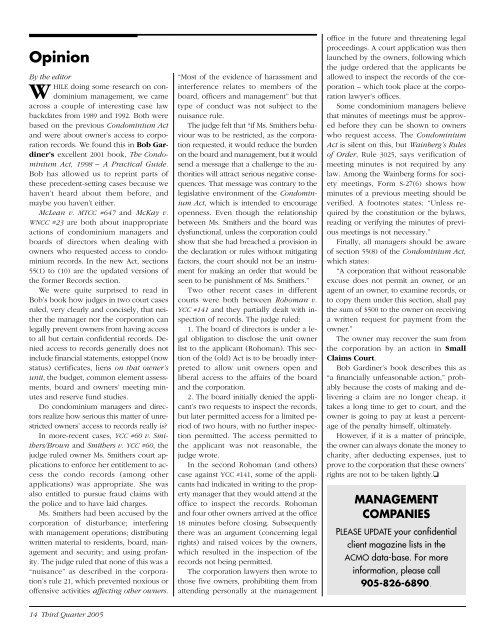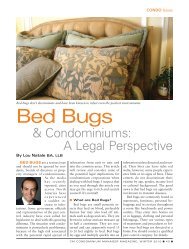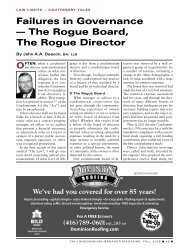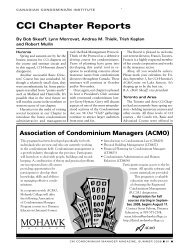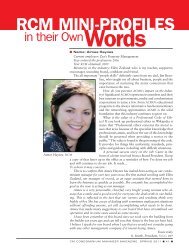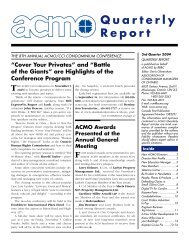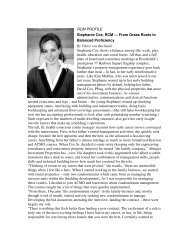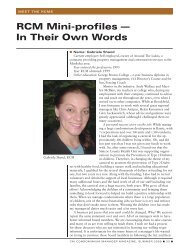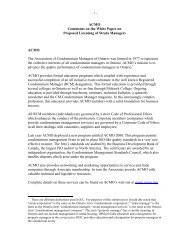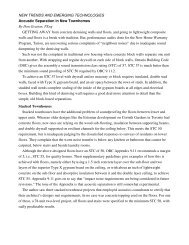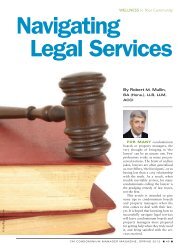Quarterly Report - Association of Condominium Managers of Ontario
Quarterly Report - Association of Condominium Managers of Ontario
Quarterly Report - Association of Condominium Managers of Ontario
You also want an ePaper? Increase the reach of your titles
YUMPU automatically turns print PDFs into web optimized ePapers that Google loves.
Opinion<br />
By the editor<br />
WHILE doing some research on condominium<br />
management, we came<br />
across a couple <strong>of</strong> interesting case law<br />
backdates from 1989 and 1992. Both were<br />
based on the previous <strong>Condominium</strong> Act<br />
and were about owner’s access to corporation<br />
records. We found this in Bob Gardiner’s<br />
excellent 2001 book, The <strong>Condominium</strong><br />
Act, 1998 – A Practical Guide.<br />
Bob has allowed us to reprint parts <strong>of</strong><br />
these precedent-setting cases because we<br />
haven’t heard about them before, and<br />
maybe you haven’t either.<br />
McLean v. MTCC #647 and McKay v.<br />
WNCC #23 are both about inappropriate<br />
actions <strong>of</strong> condominium managers and<br />
boards <strong>of</strong> directors when dealing with<br />
owners who requested access to condominium<br />
records. In the new Act, sections<br />
55(1) to (10) are the updated versions <strong>of</strong><br />
the former Records section.<br />
We were quite surprised to read in<br />
Bob’s book how judges in two court cases<br />
ruled, very clearly and concisely, that neither<br />
the manager nor the corporation can<br />
legally prevent owners from having access<br />
to all but certain confidential records. Denied<br />
access to records generally does not<br />
include financial statements, estoppel (now<br />
status) certificates, liens on that owner’s<br />
unit, the budget, common element assessments,<br />
board and owners’ meeting minutes<br />
and reserve fund studies.<br />
Do condominium managers and directors<br />
realize how serious this matter <strong>of</strong> unrestricted<br />
owners’ access to records really is?<br />
In more-recent cases, YCC #60 v. Smithers/Brown<br />
and Smithers v. YCC #60, the<br />
judge ruled owner Ms. Smithers court applications<br />
to enforce her entitlement to access<br />
the condo records (among other<br />
applications) was appropriate. She was<br />
also entitled to pursue fraud claims with<br />
the police and to have laid charges.<br />
Ms. Smithers had been accused by the<br />
corporation <strong>of</strong> disturbance; interfering<br />
with management operations; distributing<br />
written material to residents, board, management<br />
and security; and using pr<strong>of</strong>anity.<br />
The judge ruled that none <strong>of</strong> this was a<br />
“nuisance” as described in the corporation’s<br />
rule 21, which prevented noxious or<br />
<strong>of</strong>fensive activities affecting other owners.<br />
“Most <strong>of</strong> the evidence <strong>of</strong> harassment and<br />
interference relates to members <strong>of</strong> the<br />
board, <strong>of</strong>ficers and management” but that<br />
type <strong>of</strong> conduct was not subject to the<br />
nuisance rule.<br />
The judge felt that “if Ms. Smithers behaviour<br />
was to be restricted, as the corporation<br />
requested, it would reduce the burden<br />
on the board and management, but it would<br />
send a message that a challenge to the authorities<br />
will attract serious negative consequences.<br />
That message was contrary to the<br />
legislative environment <strong>of</strong> the <strong>Condominium</strong><br />
Act, which is intended to encourage<br />
openness. Even though the relationship<br />
between Ms. Smithers and the board was<br />
dysfunctional, unless the corporation could<br />
show that she had breached a provision in<br />
the declaration or rules without mitigating<br />
factors, the court should not be an instrument<br />
for making an order that would be<br />
seen to be punishment <strong>of</strong> Ms. Smithers.”<br />
Two other recent cases in different<br />
courts were both between Rohoman v.<br />
YCC #141 and they partially dealt with inspection<br />
<strong>of</strong> records. The judge ruled:<br />
1. The board <strong>of</strong> directors is under a legal<br />
obligation to disclose the unit owner<br />
list to the applicant (Rohoman). This section<br />
<strong>of</strong> the (old) Act is to be broadly interpreted<br />
to allow unit owners open and<br />
liberal access to the affairs <strong>of</strong> the board<br />
and the corporation.<br />
2. The board initially denied the applicant’s<br />
two requests to inspect the records,<br />
but later permitted access for a limited period<br />
<strong>of</strong> two hours, with no further inspection<br />
permitted. The access permitted to<br />
the applicant was not reasonable, the<br />
judge wrote.<br />
In the second Rohoman (and others)<br />
case against YCC #141, some <strong>of</strong> the applicants<br />
had indicated in writing to the property<br />
manager that they would attend at the<br />
<strong>of</strong>fice to inspect the records. Rohoman<br />
and four other owners arrived at the <strong>of</strong>fice<br />
18 minutes before closing. Subsequently<br />
there was an argument (concerning legal<br />
rights) and raised voices by the owners,<br />
which resulted in the inspection <strong>of</strong> the<br />
records not being permitted.<br />
The corporation lawyers then wrote to<br />
those five owners, prohibiting them from<br />
attending personally at the management<br />
<strong>of</strong>fice in the future and threatening legal<br />
proceedings. A court application was then<br />
launched by the owners, following which<br />
the judge ordered that the applicants be<br />
allowed to inspect the records <strong>of</strong> the corporation<br />
– which took place at the corporation<br />
lawyer’s <strong>of</strong>fices.<br />
Some condominium managers believe<br />
that minutes <strong>of</strong> meetings must be approved<br />
before they can be shown to owners<br />
who request access. The <strong>Condominium</strong><br />
Act is silent on this, but Wainberg’s Rules<br />
<strong>of</strong> Order, Rule 3025, says verification <strong>of</strong><br />
meeting minutes is not required by any<br />
law. Among the Wainberg forms for society<br />
meetings, Form S-27(6) shows how<br />
minutes <strong>of</strong> a previous meeting should be<br />
verified. A footnotes states: “Unless required<br />
by the constitution or the bylaws,<br />
reading or verifying the minutes <strong>of</strong> previous<br />
meetings is not necessary.”<br />
Finally, all managers should be aware<br />
<strong>of</strong> section 55(8) <strong>of</strong> the <strong>Condominium</strong> Act,<br />
which states:<br />
“A corporation that without reasonable<br />
excuse does not permit an owner, or an<br />
agent <strong>of</strong> an owner, to examine records, or<br />
to copy them under this section, shall pay<br />
the sum <strong>of</strong> $500 to the owner on receiving<br />
a written request for payment from the<br />
owner.”<br />
The owner may recover the sum from<br />
the corporation by an action in Small<br />
Claims Court.<br />
Bob Gardiner’s book describes this as<br />
“a financially unfeasonable action,” probably<br />
because the costs <strong>of</strong> making and delivering<br />
a claim are no longer cheap, it<br />
takes a long time to get to court, and the<br />
owner is going to pay at least a percentage<br />
<strong>of</strong> the penalty himself, ultimately.<br />
However, if it is a matter <strong>of</strong> principle,<br />
the owner can always donate the money to<br />
charity, after deducting expenses, just to<br />
prove to the corporation that these owners’<br />
rights are not to be taken lightly.❏<br />
MANAGEMENT<br />
COMPANIES<br />
PLEASE UPDATE your confidential<br />
client magazine lists in the<br />
ACMO data-base. For more<br />
information, please call<br />
905-826-6890.<br />
14 Third Quarter 2005


